

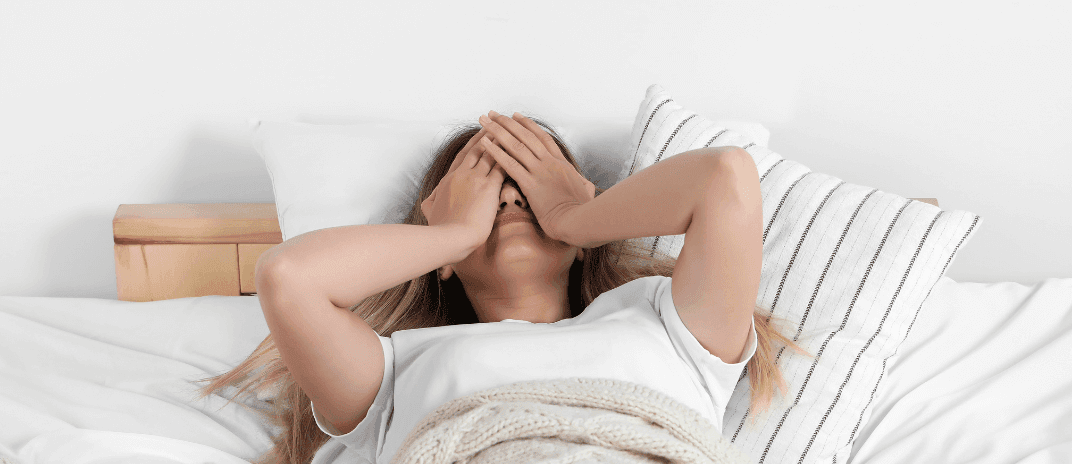
Are you tired of restless sleep at night and waking up feeling exhausted? The endless tossing and turning in bed, or waking up often, leaves you with poor quality sleep and disrupts your deep sleep.
In this article, we’ll explore strategies to help you achieve peaceful nights and wake up refreshed. You’ll learn about the causes of restless sleep, including environmental factors and medical conditions, and discover strategies for improving sleep hygiene.
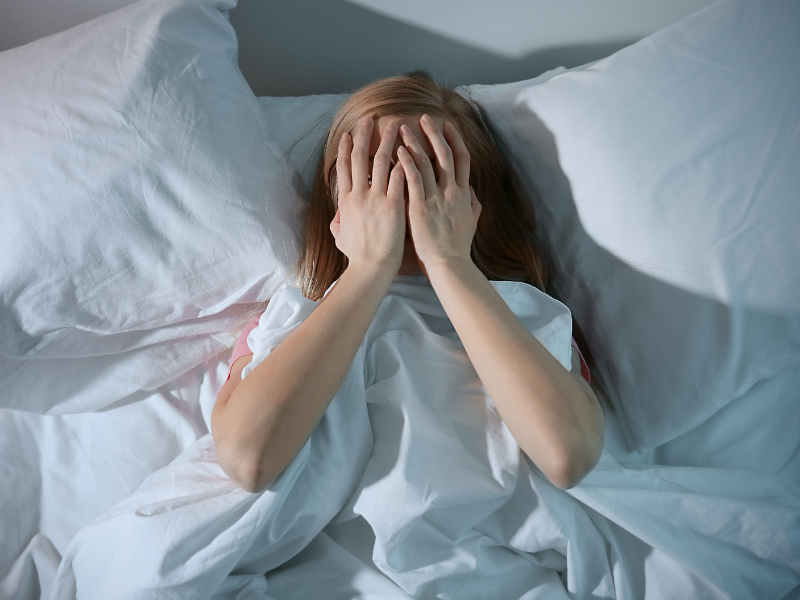
Approximately 34% of Americans experience restless sleep or ‘poor’ sleep quality every night [1].
Restless sleep can be referred to as a sleeping pattern in which you are constantly moving around in bed and feeling uneasy. Sleep-related breathing disorders, such as obstructive sleep apnea, can also contribute to restless sleep by causing frequent awakenings and disrupting deep sleep. This feeling of not being able to sleep despite feeling tired can affect your quality of life in the long term.
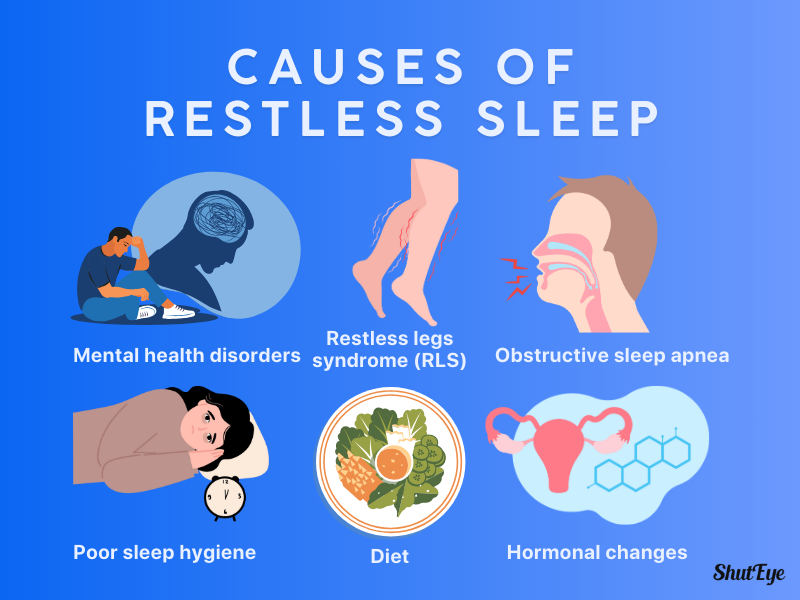
Some of the factors that may contribute to this disruptive sleep experience include [2]:
Disruptions in deep sleep, the most restorative stage of sleep, can be caused by various conditions, leading to poor overall sleep quality.
While restless sleep is not an identified sleep disorder, it is still a sleep problem many people experience. It is also a highly subjective experience, meaning everyone may have different symptoms.
Some common symptoms of restless sleep include:
If you experience these symptoms regularly, you may consider consulting a healthcare professional for further advice and treatment options.
Some strategies to overcome this sleep problem involve establishing good sleep hygiene. By implementing healthy habits and creating a conducive sleep environment, you can improve your sleep quality and reduce restless sleep.
Here are some strategies to help you establish proper sleep hygiene:
| Strategies for Proper Sleep Hygiene |
|---|
| 1. Stick to a consistent sleep schedule: Go to bed and wake up at the same time every day, even on weekends. This will help promote better sleep. Irregular sleep schedules can affect your body’s internal clock, making it more likely for you to have restless sleep. |
| 2. Create a relaxing bedtime routine: Engage in soothing activities before bed, such as reading, taking a warm bath, or practicing relaxation techniques like deep breathing. Avoid stimulating activities and electronic devices close to bedtime. |
| 3. Make your sleep environment comfortable: Create a sleep-friendly environment by keeping your bedroom cool, dark, and quiet. Use comfortable bedding and consider using white noise machines or earplugs if necessary. |
Addressing restless sleep in different age groups requires tailored strategies and approaches. Each age group faces unique challenges and factors that contribute to restless sleep. The table below outlines some of the common factors and strategies for managing restless sleep in different age groups.
| Age Group | Common Factors Contributing to Restless Sleep | Strategies for Managing Restless Sleep |
|---|---|---|
| Infants | Disrupted sleep patterns, growth spurts | Establishing a consistent bedtime routine, ensuring a comfortable sleep environment |
| Toddlers | Separation anxiety, fear of the dark | Implementing soothing bedtime rituals, using nightlights, and providing comfort items |
| Children | Sleep disorders, screen time before bed | Encouraging healthy sleep habits, setting screen time limits, creating a calming bedtime routine |
| Teens | Biological sleep changes, academic stress | Promoting a consistent sleep schedule, managing stress, limiting caffeine intake |
| Adults | Stress, poor sleep hygiene | Practicing good sleep hygiene, managing stress through relaxation techniques, keeping a sleep journal, or seeking medical advice if necessary |
| Elderly | Age-related conditions, sleep disorders | Addressing underlying medical conditions, creating a sleep-friendly environment, maintaining a regular sleep schedule |

If you’re experiencing persistent restless sleep, it’s important to seek medical advice for proper evaluation and guidance. Here are three reasons why seeking medical advice is crucial:
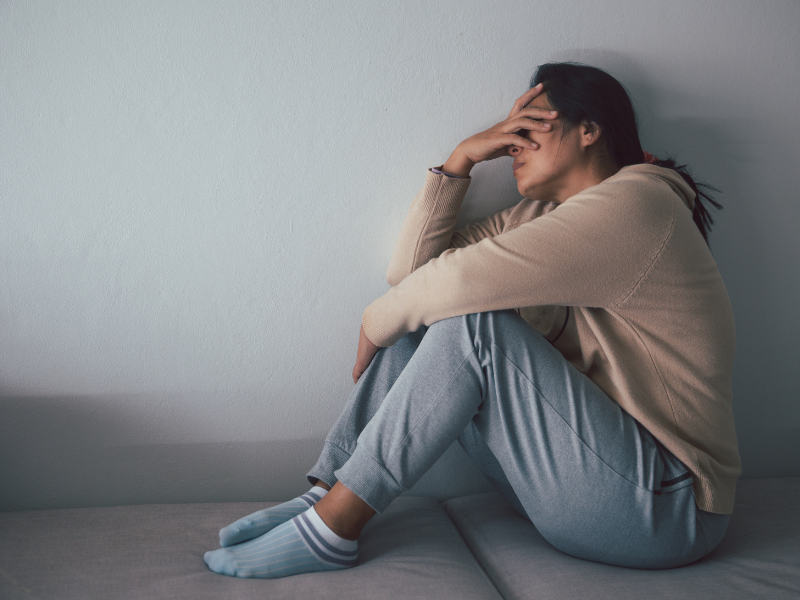
Manage stress and anxiety by incorporating relaxation techniques and practicing self-care to improve your sleep quality. Here are three strategies for managing stress and anxiety to help you achieve peaceful nights:
1. Deep Breathing: Engage in deep breathing exercises before bedtime to calm your mind and relax your body. Breathe in slowly through your nose, hold for a few seconds, and then exhale slowly through your mouth. This simple technique can help reduce stress and promote a sense of calm.
2. Mindfulness Meditation: Practice mindfulness meditation to focus your attention on the present moment and let go of racing thoughts. Find a quiet space, sit comfortably, and bring your attention to your breath or a specific object. This can help reduce anxiety and promote relaxation.
3. Self-Care Rituals: Incorporate self-care rituals into your evening routine to create a sense of calm and relaxation before bed. This could include taking a warm bath, reading a book, listening to soothing music, or practicing gentle stretching exercises. Prioritizing self-care can help reduce stress and anxiety, leading to more restful sleep.
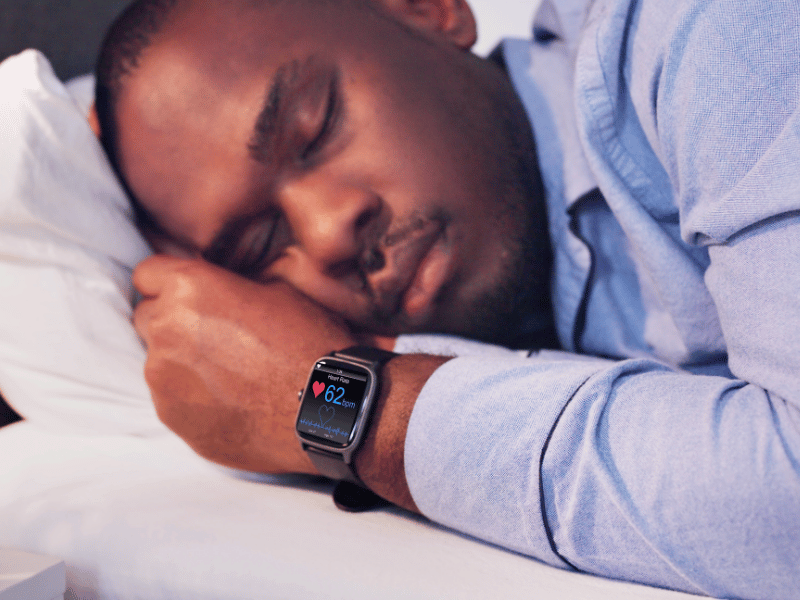
By incorporating technology into your sleep routine, you can enhance your ability to address underlying medical conditions and improve your restless sleep.
Here are three ways technology can help you sleep better:
1. Sleep trackers: These devices can monitor your sleep patterns, including the amount of time spent tossing and turning all night. By tracking your sleep quality, you can identify sleep disruptions and make necessary adjustments to improve your sleep at night.
2. Sleep apps: There are various apps available such as ShutEye® that offer guided meditation, relaxing sounds, and white noise to help you fall asleep faster and stay asleep throughout the night. These apps can also provide insights into your sleep habits and offer personalized recommendations for getting a good night’s sleep.
3. CPAP machines: A CPAP (continuous positive airway pressure) machine can be a game-changer for sleep apnea patients. This device helps to keep your airway open during sleep, preventing sleep disruptions and improving the quality of sleep.
Restless sleep can be managed by establishing good sleep hygiene. This is done by ensuring that you stick to a consistent sleep schedule, manage your stress and anxiety well, and create a comfortable sleep environment among others.
To help you practice good sleep hygiene and improve your sleep habits, consider trying the ShutEye® app. ShutEye® is a patented sleep-tracking app that helps you to improve sleep quality by tracking your sleep cycle and offering personalized recommendations.
American Psychiatric Association (2024) What are Sleep Disorders? [online]. Available at: https://www.psychiatry.org/patients-families/sleep-disorders/what-are-sleep-disorders
UPMC (2022) Top Causes of Nighttime Restlessness — and How to Manage Them [online]. Available at: https://share.upmc.com/2022/04/nighttime-restlessness/